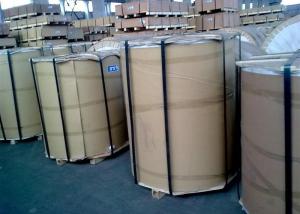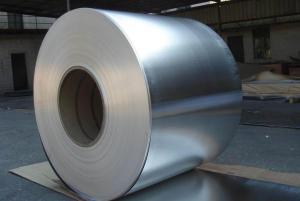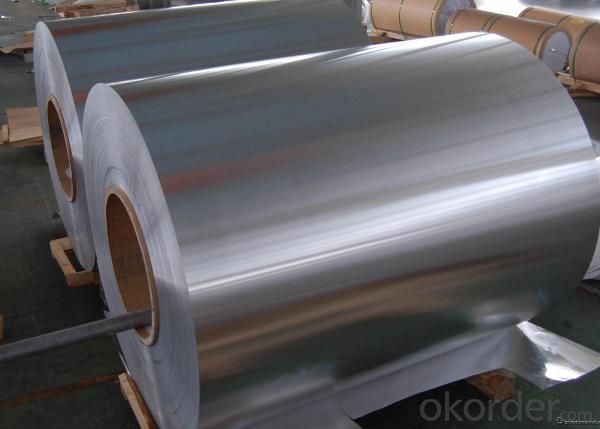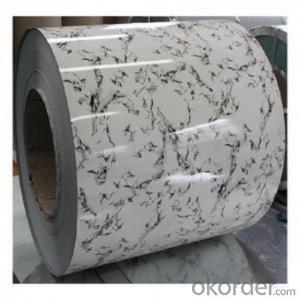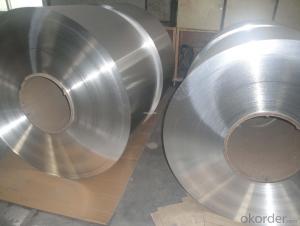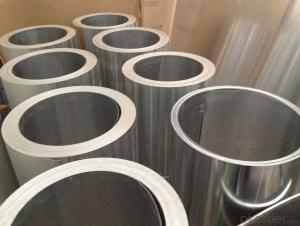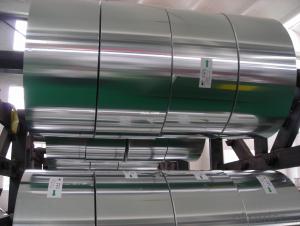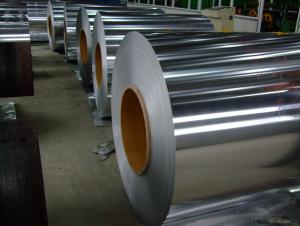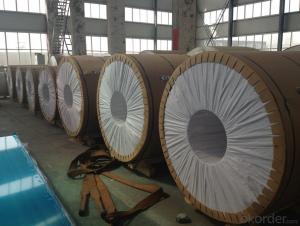High Quality 14 Aluminum Coil Grey Made in China
- Loading Port:
- China main port
- Payment Terms:
- TT or L/C
- Min Order Qty:
- 3 m.t.
- Supply Capability:
- 10000 m.t./month
OKorder Service Pledge
OKorder Financial Service
You Might Also Like
1. Specifications of Aluminum Coil
| Alloy Number | AA1xxx (AA1050, AA1060, AA1070, AA1100 etc.) AA3xxx (AA3003, AA3004, AA3005, AA3105 etc.) AA5xxx (AA5052, AA5083, AA5754 etc.) AA8xxx (AA8011, AA8006 etc.) |
| Temper | H14, H16, H18, H22, H24, H26, H32, O/F |
| Thickness | 0.2mm - 100mm |
| Width | 10mm- 2200mm |
| Standard | Standard: GB/T 3880-2006 |
Special Specification is available on customer’s requirements
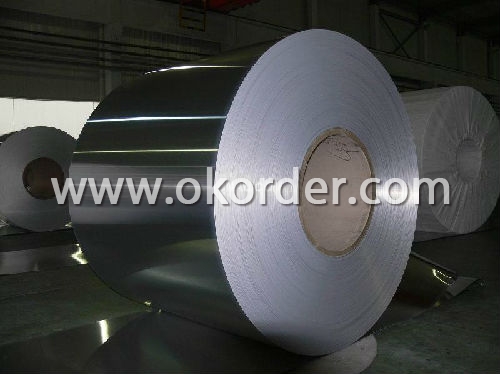
2. Usage/Applications of Aluminum Coils AA3003
Aluminum Coils has a wide variety of uses in the construction industry including aluminium siding and roofing. Sheet is also used widely in construction, decoration, transport applications and other various industrial filed, such as automobile body panels, airframes, curtain walls and the hulls of boats etc.
3. Packaging & Delivery of Aluminum Coils AA3003
Packaging: Seaworth package, water-proof paper wrapped inside, carton wrapped outside in wooden pallets.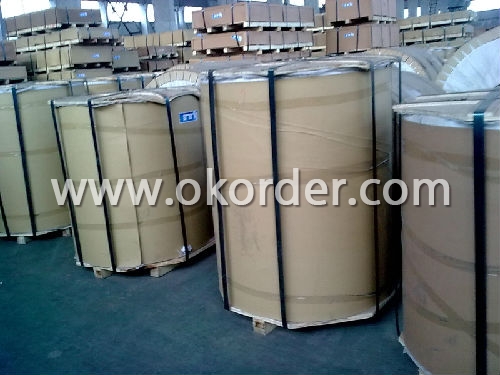
- Q: Why is the aluminum roll upset?
- Mainly in the aluminum slitting process, for various reasons, does not meet the standards and specifications of products, can be used to roll the machine from the new trimming and slitting, winding up to meet customer needs of product specifications
- Q: What are the safety measures one should take when using aluminum coils indoors?
- <p>When using aluminum coils indoors, it's crucial to ensure proper ventilation to prevent the buildup of gases that can be harmful if inhaled in large quantities. Always follow the manufacturer's guidelines for installation and operation. Keep the coils away from flammable materials and ensure they are securely fastened to prevent tipping or falling. Regularly inspect the coils for any signs of damage or wear, and replace them if necessary. Never use aluminum coils in enclosed spaces without proper exhaust systems, and always have a fire extinguisher nearby in case of emergencies.</p>
- Q: Can aluminum coils be used for automotive heat shields?
- Automotive heat shields can indeed utilize aluminum coils. Aluminum, known for its outstanding thermal conductivity and high melting point, is frequently employed as a heat shield material. Its lightweight nature and remarkable resistance to corrosion make it particularly well-suited for automotive purposes. By effortlessly molding aluminum coils into the desired configuration, effective heat insulation can be attained, safeguarding delicate components from the engine or exhaust system's excessive heat. Moreover, aluminum is cost-efficient and easily accessible, contributing to its widespread preference as an automotive heat shield material.
- Q: How are aluminum coils cut and shaped?
- Various methods and tools are utilized to cut and shape aluminum coils, depending on the desired size and shape. Slitting, shearing, and laser cutting are the most commonly employed techniques. Slitting is the act of dividing a wide coil into narrower strips. This procedure entails passing the coil through a series of circular blades that make precise cuts along its length. Thin aluminum strips are typically produced using this method, which can then be further processed or utilized in various applications. Shearing is another popular approach for cutting aluminum coils. It involves the use of a machine with a moving blade to slice through the coil. By applying pressure to the coil, a clean and straight cut is achieved. Shearing is commonly employed for cutting thicker aluminum coils and is ideal for creating straight cuts without deformations. Laser cutting is a more advanced technique used to cut and shape aluminum coils. It employs a high-powered laser beam to either melt or vaporize the metal along a predetermined path. This method offers exceptional precision and enables the creation of complex shapes and designs on the aluminum. Laser cutting is widely used in industries that require intricate and detailed cuts. Following the cutting process, various methods such as bending, rolling, stamping, or forming can be employed to further shape the aluminum coils. These techniques allow for the creation of different geometries and forms based on the specific requirements of the intended application. Overall, the cutting and shaping of aluminum coils involve a variety of techniques and tools, each suitable for different requirements. The choice of method depends on factors such as the coil's thickness, desired shape, and the level of precision necessary for the final product.
- Q: How are aluminum coils used in the manufacturing of cookware?
- Aluminum coils are used in the manufacturing of cookware as they provide excellent heat conductivity, allowing for even and efficient cooking. These coils are shaped and formed into various cookware items like pots, pans, and baking sheets. The lightweight nature of aluminum ensures ease of handling and maneuverability for users. Additionally, the durability and corrosion resistance of aluminum make it a popular choice for cookware, ensuring long-lasting and reliable kitchen tools.
- Q: Can aluminum coils be used in electrical busbars?
- Yes, aluminum coils can be used in electrical busbars. Aluminum is a commonly used material for busbars due to its high electrical conductivity, low cost, and lightweight properties. Aluminum coils can be easily formed into various shapes and sizes to fit specific busbar requirements. Additionally, aluminum has good thermal conductivity, which allows for efficient heat dissipation in high current applications. However, it is important to consider the current carrying capacity, mechanical strength, and corrosion resistance of aluminum coils when selecting them for busbar applications.
- Q: What are the common handling and storage practices for aluminum coils?
- To maintain the integrity and prevent damage or degradation of aluminum coils, several key steps should be taken: 1. Minimize physical damage: Handle and store aluminum coils carefully to reduce the risk of physical harm. This involves using appropriate lifting equipment to avoid dropping or mishandling the coils. Additionally, store them in a secure location away from potential hazards like heavy machinery or sharp objects. 2. Ensure proper stacking and support: When stacking aluminum coils, evenly distribute the weight and avoid overloading. Uneven support or excessive weight can cause deformation or collapse. It is advisable to use suitable stacking equipment and supports, such as pallets or racks, to maintain the coils' integrity. 3. Protect against moisture and corrosion: Aluminum is prone to corrosion, especially in the presence of moisture. Thus, it is crucial to store the coils in a dry environment to prevent rust or other forms of corrosion. Shield the coils from rain, snow, or excessive humidity by storing them in a covered area or inside a warehouse. Additionally, wrapping the coils in moisture-resistant packaging, like plastic, offers an extra layer of defense. 4. Control temperature: Extreme temperatures can affect the quality and performance of aluminum coils. To prevent adverse effects, store them in a temperature-controlled environment. High temperatures can cause expansion or distortion, while extreme cold can make them brittle and prone to cracking. Maintaining a stable temperature within the recommended range ensures the longevity and usability of the coils. 5. Follow guidelines: It is vital to adhere to any specific handling and storage guidelines provided by the manufacturer or supplier. These guidelines may include recommendations on stacking height, weight limits, and necessary precautions to prevent damage or deformation. By following these guidelines, the quality and usability of the coils can be maintained. By implementing these common practices, the protection, integrity, and optimal performance of aluminum coils can be ensured throughout their lifespan.
- Q: Can aluminum coils be used in outdoor or exposed applications?
- Yes, aluminum coils can be used in outdoor or exposed applications. Aluminum is a durable and corrosion-resistant material, making it suitable for outdoor use. Additionally, aluminum coils can withstand various weather conditions, making them a popular choice for outdoor or exposed applications such as air conditioning systems, roofing, and transportation.
- Q: What are the weight considerations when using aluminum coils?
- When incorporating aluminum coils, there are various factors to consider regarding weight. To begin with, aluminum coils generally possess a lighter weight in comparison to other metals, such as steel. This characteristic makes them a favored choice in industries prioritizing weight reduction, like automotive manufacturing or aerospace applications. The lightweight nature of aluminum coils leads to enhanced fuel efficiency in vehicles and increased payload capacity in airplanes. Furthermore, it is important to take into account the weight of the aluminum coil itself. Depending on the specific usage, the coil's weight may need to fall within certain limits to ensure proper functionality and structural integrity. For instance, in HVAC systems, the weight of the aluminum coil must be appropriate for secure mounting and capable of withstanding vibrations or pressure changes. Moreover, the weight of the aluminum coil can impact transportation and installation. Lighter coils are simpler to handle, transport, and install, thereby reducing the time and effort required for these processes. This advantage can be particularly valuable in construction projects that involve a large quantity of aluminum coils. Additionally, it is crucial to consider the weight-bearing capacity of the structures or equipment that will support or utilize the aluminum coils. The combined weight of the coils, along with any additional components or materials, should not exceed the load capacity of the system to prevent structural failure or safety hazards. Lastly, the weight of aluminum coils can influence cost considerations. Since the price of aluminum is typically based on weight, lighter coils may prove to be more cost-effective when compared to heavier alternatives. However, it is important to strike a balance between weight reduction and meeting the required performance and strength specifications. In conclusion, weight considerations when using aluminum coils encompass various factors, including the overall benefits of weight reduction, the weight of the coil itself, ease of transportation and installation, load-bearing capacity, and cost implications. Taking these considerations into account ensures the successful and efficient utilization of aluminum coils in diverse industries and applications.
- Q: Can aluminum coils be used for food processing equipment?
- Yes, aluminum coils can be used for food processing equipment. Aluminum is a common choice for food processing equipment due to its excellent thermal conductivity, corrosion resistance, and lightweight nature. It is widely used in the food industry for various applications such as heat exchangers, evaporators, and condensers. Aluminum coils are specifically designed to efficiently transfer heat and maintain a stable temperature, making them suitable for food processing equipment that requires precise temperature control. Additionally, aluminum is a non-toxic material, ensuring that it does not contaminate the food being processed. Therefore, aluminum coils are a reliable and safe choice for food processing equipment.
1. Manufacturer Overview
| Location | Henan, China |
| Year Established | 1996 |
| Annual Output Value | Above US$200 Million |
| Main Markets | Mid East;Eastern Europe;North America |
| Company Certifications | ISO 9001:2000;ISO 14001:2004;OHSAS 18001 |
2. Manufacturer Certificates
| a) Certification Name | |
| Range | |
| Reference | |
| Validity Period |
3. Manufacturer Capability
| a) Trade Capacity | |
| Nearest Port | Shanghai |
| Export Percentage | 30%-50% |
| No.of Employees in Trade Department | 21-50 People |
| Language Spoken: | English;Chinese |
| b) Factory Information | |
| Factory Size: | Above 100,000 square meters |
| No. of Production Lines | Above 10 |
| Contract Manufacturing | OEM Service Offered;Design Service Offered |
| Product Price Range | Average |
Send your message to us
High Quality 14 Aluminum Coil Grey Made in China
- Loading Port:
- China main port
- Payment Terms:
- TT or L/C
- Min Order Qty:
- 3 m.t.
- Supply Capability:
- 10000 m.t./month
OKorder Service Pledge
OKorder Financial Service
Similar products
Hot products
Hot Searches
Related keywords

